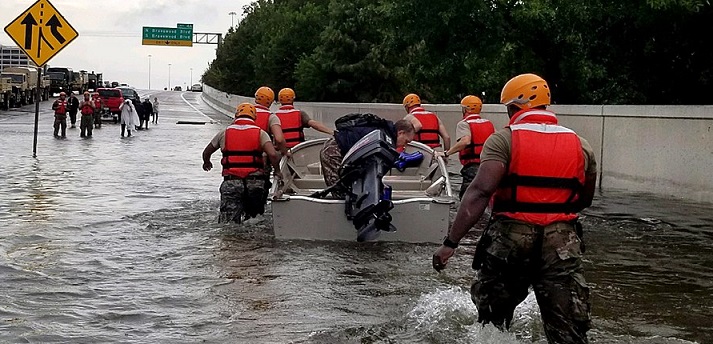by James R. Campbell
Written on August 29, 2017

Huricane Harvey made landfall on the Texas gulf coast early on the morning of August 26, 2017. The storm was a category four, with wind speeds near one hundred thirty miles an hour. Those wind speeds are capable of a great deal of damage to anything in their path. I am sure that tremendous destruction was wreaked by the winds that accompanied Harvey as it came ashore.
But the most outstanding feature of the storm has been the rain. Houston alone has received an estimated forty inches. Other cities along the coast have sustained devastating losses as a result.
Fortunately, the death toll has been blessedly low. At last report, fourteen people have lost their lives. By contrast, 1800 died during Hurricane Katrina. The cost to homeowners in the effected region, at least $30.000.000.000, and that doesn’t begin to include the businesses, infrastructure, the refineries. Gas prices are rising accordingly, because production has been cut.
Unlike Katrina, state and national resources are mobilized. At the helm of this effort, Texas governor Gregg Abbot. He is doing everything he can to provide for those in need, and other cities have stepped up to the plate. Governor Abbot has mobilized the Texas National Guard to assist in rescue efforts, as well as providing emergency supplies for the victims.
President Trump is on his way to Texas. FEMA is working at breakneck speed to tend to the disaster zone.
Ordinary people are coming forward to rescue others who are stranded on rooftops and in vehicles. People are using wading pools and inner tubes as rafts in order to navigate the rising flood waters. Harvey is moving back in to the gulf, and is expected to double back toward Texas and Louisiana, bringing more rain with the risk of even more flooding. It will take years to rebuild. Many who live in the area now will decide to move out. No-one can blame these people. They may find it emotionally draining to remain where they are, or they may feel safer leaving the coast after this event.
Looking ahead, the problems in rebuilding are humongous. The risks are many, both in the short and long term. Debris with nails, broken glass, downed power lines, and deadly bacteria that can cause illness, or increase the death rate are obvious concerns. Another difficulty is posed by alligators and venomous snakes. There are at least six hundred thousand gators in Texas, possibly more. Most of these are migrating from the wild, as are the venomous snakes. Thanks to the flood, these reptiles, like their human counterparts, are looking for an escape that will bring them to dry land. Wildlife experts advise that people not bother the gators and snakes, who will not react unless they feel threatened.
A long-term problem that must be considered: black mold. It grows on cellulose. Cellulose is a main component of many building materials, sheetrock and drywall, for instance. If the temperature is right, and there is ample water and growing medium, it will proliferate without much trouble. The symptoms of exposure: internal bleeding from the respiratory tract, prolonged respiratory and neurological issues that can result in permanent damage. The looming misfortune is that there is an unprecedented prospect for a much higher than expected rise in the rate of contamination from black mold.
I have watched countless news feeds about the disaster. My prayer is that 1. The victims will recover to extent that they can under circumstances, and 2. That we never forget the good that has come from this tragic event, which will alter the lives of those in its path forever. In that the storm has brought strangers together, some good has come from it. We need each other in good times and bad, regardless of the weather.
As always, thanks for your time.
About the Author
James R. Campbell, 61, is poet and writer living with total blindness. He has a Bachelor’s in psychology. He has written articles for the Matilda Ziegler Magazine and Consumervision. A a member of Behind our Eyes, Campbell has three poem collections on CD. They can be downloaded at Recordinglibrary.org. In his free time, he likes cooking, playing harmonica, reptiles, and keeping up with current events.


